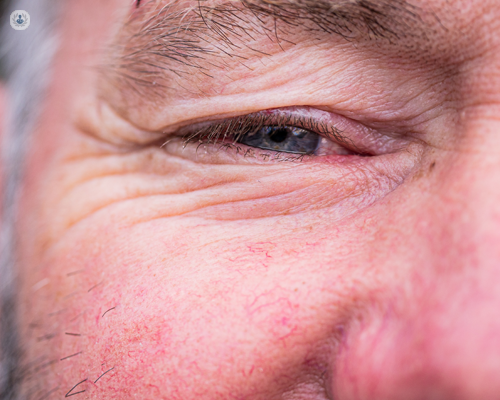Can cataracts be reversed or improved without surgery?
Autore:Cataracts is the topic up for discussion in our latest article here, as revered consultant ophthalmologist, Mr Amar Alwitry, outlines and details the various different causes behind the development of cataracts, and tells us what we can do in order to reduce our chances of suffering from them in the future.

What are the causes of cataracts in the eye?
Normal vision requires a clear image hitting the retina. This clear image is finetuned by the lens inside your eye. It is just like the lens in a magnifying glass but about smartie size. It is normally clear, but as time goes by, it becomes cloudy, making your vision blurry, hazy, or less distinct.
Most cataracts occur as a result of natural changes in your eyes as you get older. We all develop cataracts with the passage of time. However, some people never need surgery, whereas in others, they develop them early and intervention is required.
Cataracts keep you from seeing clearly because light cannot easily pass through the cloudy lens. Your lens becomes opaque and may also turn yellow or brown, which can change how you see colours.
After the age of 40, the proteins in the lens of your eye naturally start to break down. Most cataracts happen because of these natural changes.
Some factors other than ageing that make cataracts more likely include:
- a family history of cataracts at a young age
- diabetes
- eye injury
- eye surgery to treat glaucoma or another eye condition
- steroid use either systemically or topically
- radiation treatment for cancer or other diseases
- smoking
- spending too much time in the sun, especially without sunglasses
How can cataracts be treated or prevented?
Generally, cataracts cannot be prevented and are a natural part of ageing. You can take steps to protect your eyes in general which may have an effect on cataract formation.
Things you should do include protecting your eyes from the sun. Wear sunglasses and a hat with a brim to block the sun. Protect your eyes from injury, so while doing activities such as using power tools, in particular hammering, grinding or drilling, or playing certain sports, you should wear protective eyewear to protect your eyes from getting accidentally injured. Smoking should also be avoided.
What are the symptoms of cataracts in the eye?
You might not have any symptoms at first when cataracts are mild. However, as they grow, cataracts can cause changes in your vision. A typical early issue is glare, whereby headlights coming towards you at night appear more dazzling, and when the sun is low, you struggle to see. You may see halos around lights.
In simple terms, your vision gradually becomes more indistinct, blurry, and/or cloudy. Colours can also look faded and washed out.
If you have cataracts, you may also notice that you have to change the prescription for your glasses or contact lenses frequently due to the lens inside the eye changing refractive power as the cataract develops.
What is the recovery time after cataract surgery?
Recovery is usually very swift. You have a shield on overnight which you remove the next morning. The eye is often a little bit sticky. Once it is cleaned with sterile water, the vision should get better. It can take several weeks for the vision to improve to its final level and you will need to get your spectacles updated for the best possible vision.
You may notice the eye is red from the anaesthetic which has been applied, but this is usually related to a burst blood vessel and nothing to worry about. You will need to use eye drops which are either a steroid or non-steroidal anti-inflammatory drop to prevent the eye becoming inflamed. Some surgeons will also prescribe antibiotics.
You can drive once you can read the number plate at 20m and are adapted to your new vision. The onus is on you to be safe on the road. If you are experiencing imbalance, then you should wait until you fully adapt before driving.
Mild exercise is allowed but you should aim to not keep your head below your heart for extended periods while straining, so no heavy lifting should be prioritised.
Can cataracts be reversed or improved without surgery?
Cataracts can only be cured by cataract surgery. There is no medical treatment available. It should be noted that just because you have a cataract does not necessarily mean that you need cataract surgery.
If you are happy with your vision, then there is no need to have surgery until things worsen and your quality of life is affected. Often, updated spectacles will sharpen your vision up enough to keep you going. Ultimately though, cataract surgery is likely to be required, and the safety profile of this surgery is excellent.
To schedule in an appointment with revered consultant ophthalmologist, Mr Amar Alwitry, simply go to his Top Doctors profile today.


